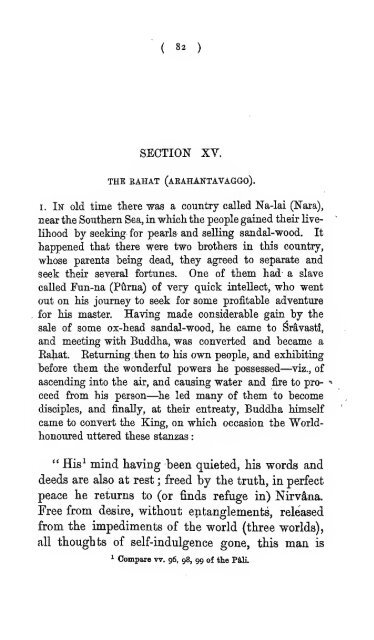Texts from the Buddhist canon : commonly known as Dhammapada
Texts from the Buddhist canon : commonly known as Dhammapada
Texts from the Buddhist canon : commonly known as Dhammapada
Create successful ePaper yourself
Turn your PDF publications into a flip-book with our unique Google optimized e-Paper software.
( 82 )<br />
SECTION XV.<br />
THE EAHAT (ARAHANTAVAGGO).<br />
I. In old time <strong>the</strong>re w<strong>as</strong> a country called Na-lai (Kara),<br />
near <strong>the</strong> Sou<strong>the</strong>rn Sea, in which <strong>the</strong> people gained <strong>the</strong>ir Uve-<br />
lihood by seeking for pearls and selling sandal-wood. It<br />
happened that <strong>the</strong>re were two bro<strong>the</strong>rs in this country,<br />
whose parents being dead, <strong>the</strong>y agreed to separate and<br />
seek <strong>the</strong>ir several fortunes. One of <strong>the</strong>m had a slave<br />
called Fun-na (Piirna) of very quick intellect, who went<br />
out on his journey to seek for some profitable adventure<br />
for his m<strong>as</strong>ter. Having made considerable gain by <strong>the</strong><br />
sale of some ox-head sandal-Wood, he came to Sr§,v<strong>as</strong>tl,<br />
and meeting with Buddha, w<strong>as</strong> converted and became a<br />
Eahat. Eeturning <strong>the</strong>n to his own people, and exhibiting<br />
before <strong>the</strong>m <strong>the</strong> wonderful powers he possessed— ^viz., of<br />
<strong>as</strong>cending into <strong>the</strong> air, and causing water and fire to pro- »<br />
ceed <strong>from</strong> his person— ^he led many of <strong>the</strong>m to become<br />
disciples, and finally, at <strong>the</strong>ir entreaty, Buddha himself<br />
came to convert <strong>the</strong> King, on which occ<strong>as</strong>ion <strong>the</strong> Worldhonouied<br />
uttered <strong>the</strong>se stanz<strong>as</strong><br />
" His^ mind having been quieted, his words and<br />
deeds are also at rest ; freed by <strong>the</strong> truth, in perfect<br />
peace he returns to (or finds refuge in) Nirvana.<br />
Free <strong>from</strong> desire, without entanglements, rele<strong>as</strong>ed<br />
<strong>from</strong> <strong>the</strong> impediments of <strong>the</strong> world (three worlds),<br />
all thoughts of self-indulgence gone, this man is<br />
1 Compare vt. 96, 98, 99 of <strong>the</strong> P&li.<br />
:<br />
'





